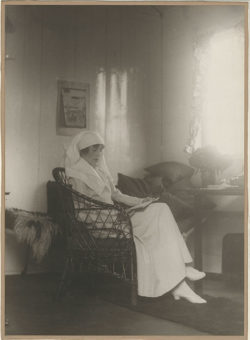Correspondence is another valuable source of life writing, chronicling a life as it was lived and shared with other letter writers. We have a wealth of correspondence here at Churchill Archives, which chart the contours of personal and professional life.
One cache of letters is those written by the novelist and poet Mary Borden (1886-1968) to Brigadier General Edward Louis Spears (1886-1974) during the First World War. During the war, Mary used her inheritance money to run a mobile hospital in France. She ran this hospital, with no medical training, whilst also continuing her prolific writing efforts – and winning prestigious awards, such as the Croix de Guerre and the Legion d’Honneur.
It was also during this time that she met Spears and embarked on an affair with him, whilst married to George Douglas Turner. Letters from 1917 reveal her husband’s suspicions about her affair, after he was sent an anonymous letter referencing an ‘erotic outburst’ – a poem that Mary had written for Spears. Even after receiving the note, Mary tells Spears how her husband ‘does not believe that they are true – he thinks it is some woman that hates me’.
Despite her husband’s dismissal of the revelation, the culture of secrecy took its toll on Mary, who writes how ‘I am feeling curiously ill. I wonder if it can be that such mutual and emotional anguish should produce that same physical pain I had before.’ Throughout her life, Borden continued to be blighted by poor health.
In 1917, Mary wrote to Spears noting how ‘she cannot deal any longer in lies’ – even though her husband did not ask her about the affair, she ‘could not…explain away the poem – it speaks for itself’. Very shortly, she would go on to divorce Turner and marry Spears in 1918. Their marriage went on to last 50 years, despite Spears’s later affair with Nancy Maurice, his secretary, whom he married upon Mary’s death.

Mary Borden in her nursing uniform during the First World War. Source: Spears Papers, SPRS 10/1/16, Churchill Archives Centre.
Find out more about:
- Mary Borden on a website dedicated to commemorating her life or by reading Jane Conway’s Mary Borden: A Woman of Two Wars. Munday Books, 2010.
- One of Mary Borden’s most popular books, The forbidden zone. London: Heinemann, 1929.
- Working with letters as historical sources in Miriam Dobson, ‘Letters’, in Reading Primary Sources: The Interpretation of Texts from Nineteenth and Twentieth Century History, ed. Miriam Dobson and Benjamin Ziemann (London: Routledge, 2009), 57–73.
Other correspondence in our collections:
- Letters relating to Anne Seagrim’s relationship with Charles Percy Snow, SEAG 3.
- Letters to Lord Esher from members of the Royal Family, including King Edward VII, Queen Alexandra, King George V, Queen Mary and Edward, Prince of Wales [later King Edward VIII and Edward, Duke of Windsor], 1878-1923, ESHR 6.
- Letters between Alexander Cadogan, Lady Theo and their eldest son, Ambrose, 1913-1968, ACAD 3.
- Professor Lise Meitner’s correspondence, including general and miscellaneous correspondence and correspondence with family and colleagues, 1911-1969, MTNR 5.
- Letters from Enoch Powell to his parents, 1940-1951, POLL 1/1/10.
- Randolph Churchill’s correspondence, with his own friends and those of his father, 1916-1992, RDCH 1.
If we’ve whetted your appetite, then do get in touch to explore our collections.
Want to catch up with earlier posts in our series? Check out our blogs on autobiographies and biographies.
Looking for useful introductions for working with life writing? Here’s some of our favourites:
- Dobson, Miriam, and Benjamin Ziemann, eds. Reading primary sources: the interpretation of texts from nineteenth and twentieth century history. Routledge, 2020.
- Barber, Sarah, and Corinna Peniston-Bird, eds. History beyond the text: a student’s guide to approaching alternative sources. Routledge, 2013.
- Summerfield, Penny. Histories of the self: Personal narratives and historical practice. Routledge, 2018.
- Saunders, Valerie, “Life Writing”. In Victorian Literature, (accessed 4 Aug. 2021).
By Cherish Watton, Archives Assistant.
Subscribe to Churchill Archives Centre News
Enter your email address:
Subscribe to the Churchill Archives News RSS feed:
